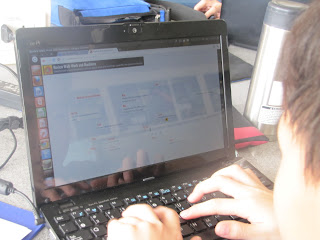Blended Learning
Blended learning has been lighting up Twitter in the last few days. Although blended learning has been around a while, blended learning basically supports the following:
- Accessing information from the web in addition to the teacher
- The ability to have discussions in class and online
- Evaluating sources of information for bias and trust-ability
- Allowing all students (no matter how confident) to participate in discussions as opposed to the smartest, most extroverted
- Creating content to teach others
 |
| A student brainstorms over wallwisher in the beginning of class |
 |
| Students sharing their predictions on "Google Docs" after an pre-lesson physics demonstration |
How to Implement Blended Learning
The inflection points to use web 2.0 tools is pretty daunting for many teachers. Some of our old-school teachers don't venture out with them as they don't know where to start. I do not profess to be an amateur or expert in the above, but I probably fall somewhere in the middle of the spectrum in terms of comfort levels and risk taking. Here are things I've learned:
- Use Tech to Support your Goals-This is the blurriest line in education today. The irony of this post of mine is that using these tools may seem like the goal, but actually it's not. The web 2.0 tools help support what you're trying to do, so you must be respectful of assessment to see whether or not students have met curricular objectives using these tools. Simply saying: "Woo-hoo. I made a Voicethread" should not be the goal.
- Use at the Beginning and End of Lessons- Brainstorming, reviewing and activating prior knowledge is a great way to introduce 2.0 tools in the classroom. Of course, you may be accessing the internet all throughout the lesson I found that I generally use new tools for virtual discussion at the beginning and end of lessons. My students have their curricula on a google doc which is an organic document that spreads out like a virus.
- It's not a Conspiracy-Diane Ravitch who is one of nations leading intellectuals (and I'm a big fan) argues that many tech tools developers are in it for the money and that an ongoing shift towards using technology in education is nothing more than a conspiracy to privatize education and pigeon hole it into a class system which will widen the gap between the rich and poor. I argue my point 1 to her and also note that many web tools are free.
- Seek your own Comfort Zone-Don't feel that you need to do any and everything the most innovative educators are doing at your school. I usually have 1, maybe 2 of these entry/exit points per lesson. After trying something for the first time, you might be surprised at how easy it was. I find myself sometimes spurring virtual discussions and creating URL's in a matter of seconds which I send to the students immediately. Sometimes we'll elicit ideas to the board, sometimes, we'll do it online. If there's time.
 |
| Students compare levels of ancestry in living things to help with classification. Blended learning environments are also supplemented with traditional approaches |
Related Posts
Wallwisher
Silkslides
Voicethread

Comments
Post a Comment